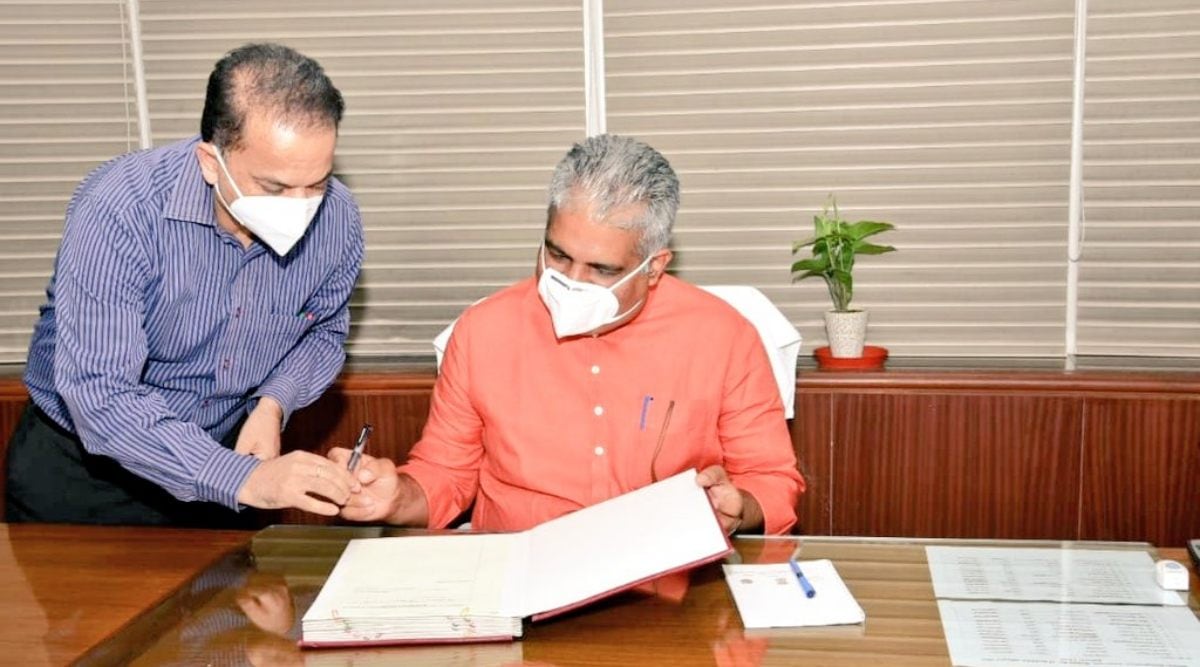MoEFCC issues SOP: Violations may lead to closing, demolition of projects
The SOP -- issued by the ministry on July 7 in the form of an Office Memorandum – is a result of orders from the National Green Tribunal, which earlier this year directed the ministry to put in place penalties and an SOP for green violations.
 Bhupender Yadav assumed charge of the Ministry of Environment, Forest and Climate Change (Twitter/@byadavbjp)
Bhupender Yadav assumed charge of the Ministry of Environment, Forest and Climate Change (Twitter/@byadavbjp)The Standard Operating Procedure (SOP) issued by the Ministry of Environment, Forests and Climate Change to deal with environmental violations includes stiff penalties — including shutting down projects and demolition of projects that have failed to acquire environmental clearance or are in non-compliance of the clearance they have received.
The SOP — issued by the ministry on July 7 in the form of an Office Memorandum – is a result of orders from the National Green Tribunal, which earlier this year directed the ministry to put in place penalties and an SOP for green violations.
The memorandum gives powers to government agencies such as the CPCB, state pollution control boards and state environment impact assessment authorities to identify such violations and take penal action against them.
In 2017, the ministry had initiated a six-month amnesty scheme on penalising green violations, which was later extended.
The SOPs refer to two categories of green violations — ‘Violations’ involving cases where construction work, including expansion of an existing project, has begun without the project proponent having acquired environmental clearance; and ‘Non-Compliance’ in which prior environmental clearance has been accorded to the project, but it is in violation of norms prescribed in the approval.
According to the SOPs laid down by the ministry, projects that are not permissible for environmental clearance are to be demolished. Projects which are permissible according to environmental law but which have not acquired the requisite clearance are to be shut down.
In cases of expansion of a project, including increase in volume of production, if environmental clearance has not been received, then the government agency can now force the project proponent to revert to the level of construction/manufacturing before the expansion.
“The permissibility of the project shall be examined from the perspective of whether such activity/project was at all eligible for grant of prior EC,” says the ministry directive.
“For instance, if a Red Industry is functioning in a CRZ-I area, which means that the activity was, in the first place, not permitted at the time of commencement of the project. Therefore, the activity is not permissible and therefore it shall be closed and demolished,” it adds.
In Violation cases, where operations have not commenced, 1 per cent of the total project cost incurred up to the date of filing of the application (for instance a fine of Rs 1 lakh for a project worth Rs 1 crore) will be levied.
In cases where operations have commenced without the required environmental clearance, 1 per cent of the total project cost and in addition 0.25 per cent of the total turnover during the period of violation will be levied.
Environmentalists, however, have raised concerns, saying the memorandum normalises “post facto regularisation of violations” – in which violations are first committed and then the project proponent files for clearance by which they “are let off by paying a penalty”.
Kanchi Kohli of the Centre for Policy Research says, “Firstly we find that this is an acknowledgement by the ministry that despite EIA rules being in place for seven years, most projects seem to continue to fall outside the prescribed environmental norms and are therefore violators. Our concern is also that this is the institutionalising of violations on the basis of the polluter pays norm. Unlike in 2017, this is not an amnesty scheme but actually makes the process of first violating and then paying a penalty and getting away with the violation a routine affair, which is in direct contradiction to the premise of the EIA. We feel that such a directive will allow violations to continue on a regular basis.’’
Kohli adds that the SOP gives “immense power” to the ministry in determining the violator and the offence. “We fear that this gives scope for violators, especially the big players, to negotiate with the ministry. These are very substantive changes and needed to have been included in the new EIA draft as an amendment with public discourse, which the ministry has circumvented by issuing it as an Office Memorandum. This was a big issue with the EIA draft 2020, which people had been protesting,” she adds.







